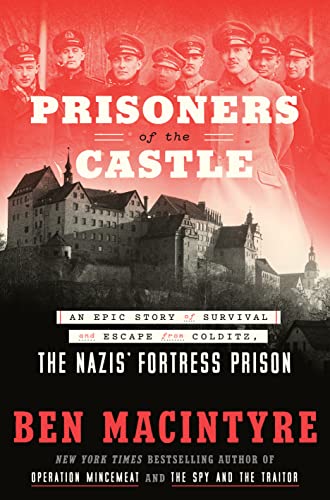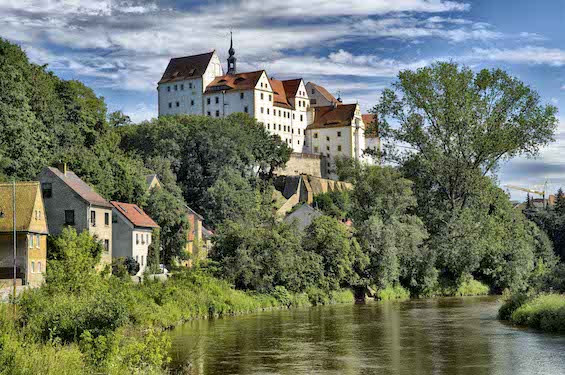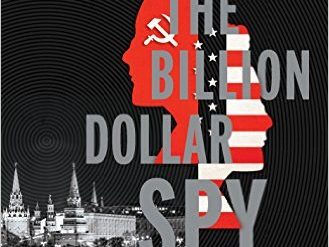
World War II prisoner-of-war escapes are a staple of adventure fiction. IMDB lists twenty-one films on the theme, most prominently the 1963 production The Great Escape, starring Steve McQueen, James Garner, and Richard Attenborough. In reality, however, successful escapes were rare. Britain’s Imperial War Museum notes that “Of the 170,000 British and Commonwealth prisoners of war in Germany in the Second World War, fewer than 1,200 of them managed to escape successfully and make a ‘home run.'” But the numbers fall far short of conveying the sheer drama in the German camps. And perhaps the most colorful examples have emerged from Colditz, the Nazi camp for Allied officers in Germany’s east from 1939 to 1945. Author Ben MacIntyre brings the drama into high relief in Prisoners of the Castle, a nonfiction rendering of life in the most famous of the nearly one hundred WWII Nazi POW camps.
Estimated reading time: 7 minutes
A maximum security prison for escape-prone officers
Beginning in 1940, Colditz Castle served as a maximum security prison for a special breed of Allied officers. Colditz held hundreds of French, British, Polish, Dutch, and Belgian officers who had been caught escaping from other POW camps. The population shifted dramatically over the years, with huge numbers of French officers sometimes housed for short periods. Understandably, a Briton himself, MacIntyre focuses on the British, some of whom were interned there for as long as five years. His biographical sketches of the best-known among them are fascinating portraits of extraordinary individuals. They’re easily worth the price of the book.
Prisoners of the Castle: An Epic Story of Survival and Escape from Colditz, the Nazis’ Fortress Prison by Ben MacIntyre (2022) pages ★★★★★

Dramatic escapes—and bestselling books
Much of the drama in MacIntyre’s account centers on the almost continuous succession of attempted escapes, many of which were extremely elaborate and required months of preparation. One British officer tried eight times, but many others were almost equally persistent. Few were successful. Although there are reports of 174 who made their way outside the castle’s walls, only thirty-two of them reached home. Colditz was 400 kilometers from Switzerland, and the route led through vast expanses of heavily policed Nazi territory.
Some of the few who did escape gained fame, becoming celebrities in Britain for years after the war. A surprising number kept diaries, as did at least one of the guards, which were among MacIntyre’s principal sources. And several wrote bestselling books about the experience, distorting and contributing to the enduring legend of Colditz in the British imagination. No doubt, it was their skill as writers which had a lot to do with making Colditz the most famous of the many WWII Nazi POW camps.
The “Prominente“
Someone high in the Nazi hierarchy—MacIntyre speculates that it was Heinrich Himmler—decided midway through the war that if Germany lost he might trade his own life for a handful of prominent British officers. When German troops captured Giles Romilly, Winston Churchill’s Communist nephew, he was sent to Colditz at Adolf Hitler’s personal order, the first of the “Prominente.” (Churchill despised the man, and in any case he would never have let such a connection influence his conduct of the war.)
Soon, at orders from above, the sons of World War I Field Marshall Douglas Haig, the Viceroy of India, and the US Ambassador to Britain joined Romilly. Other Prominente included the commander in the Warsaw Uprising and a handful of members of the sprawling British royal family. And a man masquerading as the nephew of a top British commander bluffed his way into the group, although he was only a distant cousin.
The Prominente were sequestered apart from the other officers and received better food. They were the most privileged among the prisoners at Colditz—until April 1945, when Adolf Hitler ordered that they be executed. The drama surrounding that order, which was never carried out, reveals a great deal about the state of the German military as the Nazi state disintegrated.
Conditions at Colditz were surprising
MacIntyre’s account may upend your understanding of conditions and practices in a Nazi POW camp—at least those in camps where only Western officers were imprisoned. Until the later stages of the war, as Germany’s defeat first became likely and then certain, the British, French, Dutch, Polish, and Belgian officers interned at Colditz had free access to packages from the International Red Cross that brought them a bounty of food, warm clothing, and family news on a continuous basis. In fact, because of the food they received, they ate much better and were far healthier than the Germans guarding them. But only Western officers fared well, at least at Colditz. The Wehrmacht officer in direct command of the guards insisted they be treated fairly and respectfully.
At other WWII Nazi POW camps, conditions even for officers might have been worse. And circumstances changed even at Colditz beginning in 1944, when the prison food, still the basis of their diet, grew steadily less plentiful and nutritious. Then the flow of Red Cross packages stopped, as the war came home to Germany. In the final months, the prisoners began to starve, as did the guards.
Enlisted men received harsher treatment even at Colditz, which included forced labor as batmen to the officers. Elsewhere, Soviet POWs experienced far, far worse. According to Wikipedia, “It is estimated that at least 3.3 million Soviet POWs died in Nazi custody, out of 5.7 million. This figure represents a total of 57% of all Soviet POWs and it may be contrasted with 8,300 out of 231,000 British and U.S. prisoners, or 3.6%.” Most of the Soviet soldiers who died in German custody were among the 2.8 million taken in 1941-42 as the Nazi juggernaut raged across Russian land toward Moscow and Leningrad.
About the author

Ben MacIntyre (1963-) is a columnist for The Times of London and the author of at least fourteen works of nonfiction, of which this book is the latest. His father was an Oxford University historian, and he himself gained a degree in history from St. John’s College, Cambridge. So it seems no accident that all MacIntyre’s books are histories. He is best known for his writing about World War II and espionage. Five of his books have been made into documentaries for the BBC. They are all based on in-depth research that seems the equal of anything a diligent academic historian might display.
For more reading
I’ve also reviewed five other excellent books by the author about World War II:
- Operation Mincemeat: How a Dead Man and a Bizarre Plan Fooled the Nazis and Assured Allied Victory (How the Allies fooled the Nazis with a corpse)
- Agent Sonya: Moscow’s Most Daring Wartime Spy (The extraordinary Soviet spy who gave Stalin the bomb)
- Double Cross: The True Story of the D-Day Spies (A new spin on why the Normandy invasion succeeded)
- Rogue Heroes: The History of the SAS, Britain’s Secret Special Forces Unit that Sabotaged the Nazis and Changed the Nature of War (The story of the original special forces)
- A Spy Among Friends: Kim Philby and the Great Betrayal (Was Kim Philby the greatest spy ever?)
You might also enjoy:
- 10 top nonfiction books about World War II
- Books about World War II in the Pacific
- The 10 best novels about World War II
- The 10 most consequential events of World War II
And you can always find my most popular reviews, and the most recent ones, plus a guide to this whole site, on the Home Page.

























